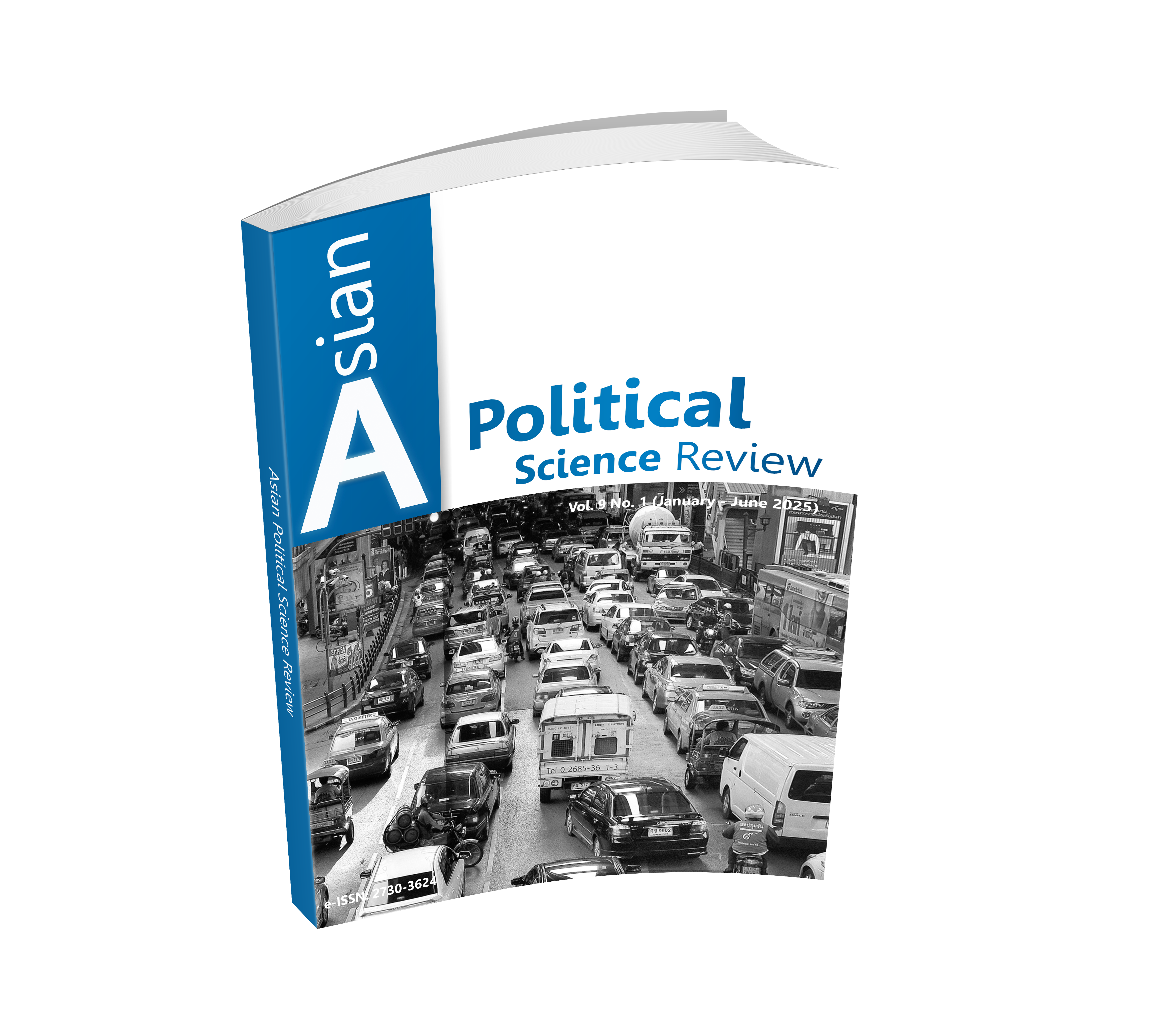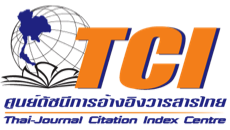INNOVATION DRIVES THE COMMUNITY TOWARDS A DEMOCRATIC INTELLECTUAL SOCIETY OF THE PEOPLE
DOI:
https://doi.org/10.14456/apsr.2025.2Keywords:
Innovation, Democratic Intellectual Society, Political Participation, Democratic Behavior, LeadershipAbstract
This study focuses on fostering a democratic intellectual society in Nakhon Pathom Province of Thailand by exploring concepts, accessibility, and strategies for development. The research objectives were to 1) synthesize the concept of a democratic intellectual society, 2) assess the community's level of access to such a society, and 3) develop strategies and innovations to guide communities toward this goal. Key findings identified six elements of a democratic intellectual society: political participation, interest in politics, democratic family structures, faith in democracy, community engagement, and concept refinement. Nakhon Pathom exhibited high understanding and access levels across these dimensions. Three critical factors influencing democracy were identified: political participation, democratic behavior, and leadership, all statistically significant. The study developed eight general guidelines and 67 specific strategies for promoting democracy, achieving a 99.2% expert approval rate. In conclusion, Nakhon Pathom demonstrates strong democratic engagement, with well-defined strategies and innovations providing a clear path for future progress.
Downloads
References
Bekkers, R., & Wiepking, P. (2011). A Literature Review of Empirical Studies of Philanthropy: Eight Mechanisms That Drive Charitable Giving. Nonprofit and Voluntary Sector Quarterly, 40(5), 924-973.
Charoenmuang, T. (2007). 100 Years of Thai Governance, 1897-1997. 6th ed. Bangkok: Kobfai.
Charoenrat, S. (2019). Development of contemporary democratic innovations for the greatest benefit of the people. Bangkok: King Prajadhipok's Institute.
Chumnasaew, P. (2016). Core competencies of Thai citizens under a democratic regime. Bangkok: Ramkhamhaeng University.
Dhamrongpanit, S. (2012). Mplus Program with Analysis of Behavioral and Social Data. Mahasarakham: Mahasarakharm University.
Inthrawut, R. (2014). Army Cyber Center. Bangkok: Army Cyber Center.
Kenaphoom, S. (2015). The Research Conceptual Framework Establishment by the Grounded Theory. Journal of Humanities and Social Science Valaya Alongkorn, 10(3), 93-103.
Kenaphoom, S. (2014). Research Philosophy: Quantity Quality. Journal of Political Science and Law Kalasin Rajabhat University, 3(2), 22-55.
Kenaphoom, S. (2016). Political Decision on the Democratic Way of Life: Concept and Forms. Humanities & Social Sciences, 33(2), 89-119.
Kenaphoom, S. (2017a). Establishment of a Survey Research Conceptual Framework on Management. ASEAN Journal of Management & Innovation, 4(1), 63-77.
Kenaphoom, S. (2017b). Political Utility influence on Political Decision. Asian Political Science Review, 1(2), 1–12.
Koonnala, P. (2020). The Role of Citizenship under Democracy of Senior High School Students in Lamphun Province. Journal of SaengKhomKham Buddhist Studies, 5(1), 85-99.
McKeown, M. (2008). The Truth About Innovation. New Jersey: Prentice Hall.
McLellan, J., & Youniss, J. (2003). Two Systems of Youth Service: Determinants of Voluntary and Required Youth Community Service. Journal of Youth and Adolescence, 32, 47-58.
Nuansakul, S., & Thaweesat, W. (1996). Thai Politics and Government. Bangkok: Ramkhamhaeng University.
Pathong, K., Ratanalongkorn, & Kenaphoom, S. (2016). Strategic Development of Democratic and Processes Civil Society Thailand under the Paradigm Principles of Buddhism. Dhammathas Academic Journal, 16(2), 255-273.
Raengsungnoen, K. (2011). Factor Analysis with SPSS and AMOS for Research. Bangkok: See-Education.
Raksasatt, A. (2000). People's Constitution with Commentary. Bangkok: Chulalongkorn University Press.
Ravanavik, K. (2022). Innovation of Management for Community Participation in Local Development. Doctor of Philosophy Thesis, Rangsit University.
Rogers, E. (1983). Diffusion of Innovations. 3rd ed. New York: The Free Press.
Samutwanich, C. (1989). Democracy, socialism, and communism in Thai politics. Bangkok: Duangdee Printing.
Sanyawiwat, S. (1983). Community development. 3rd ed. Bangkok: Thai Wattana Panich.
Sinsawat, N. (1996). Thai politics: a psychological analysis. Bangkok: Wacharin Printing.
Suphab, J. (1979). Principles of Political Science. 2nd ed. Bangkok: Thai Wattanapanich Co., Ltd.
ThaiHealth Promotion Foundation. (2014). Opening of Donkaew University for Happiness and Community Health Innovation Festival. Retrieved from www.thaihealth.or.th/เปิดมหาวิชชาลัยดอนแก้ว/.
Thaweerat, P. (2000). Research methods in behavioral and social sciences. 7th ed. Nakhon Nayok: Srinakharinwirot University.
Wattanaputi, C. (1993). Farmer adaptation to economic and social changes: A case study of a farmer group in the lower northern region (Ban Song Hong, Tha Tako District, Nakhon Sawan Province). Chiang Mai: Chiang Mai University.
Winijjakul, T. (2015). October 6, unforgettable, unforgettable: Regarding October 6, 1976. Nonthaburi: Kled Thai.
Wirasai, J., Ratchaphantharak, S., & Thapsuwan, S. (1997). General Political Science. Bangkok: Ramkhamhaeng University.
Wonglimpiyarat, J. (2015). Comparison of Internal Control Related Frauds: Cases of the Fall of BBC and Fraudulent Rice Pledging Scheme. Journal of Business Administration, 38(148), 1-19.

Downloads
Published
How to Cite
Issue
Section
License
Copyright (c) 2025 Authors

This work is licensed under a Creative Commons Attribution-NonCommercial-NoDerivatives 4.0 International License.











.png)


